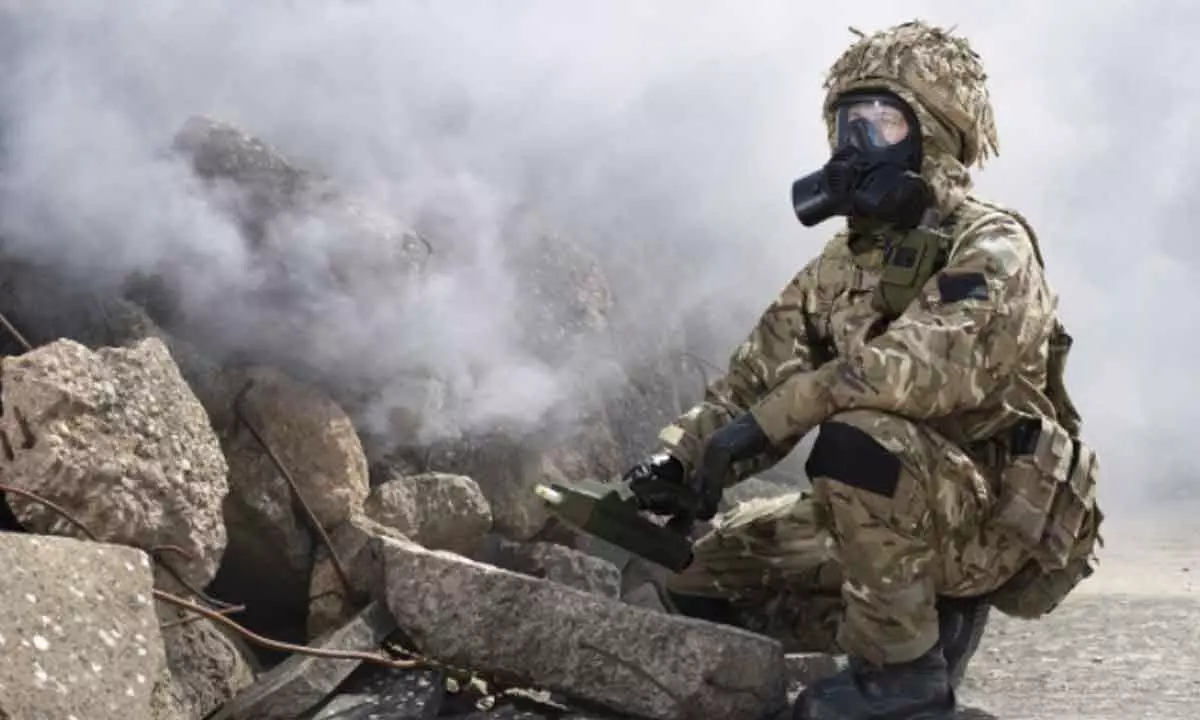Chemical weapons: How will we know if they have been used in Ukraine?

Medical records and biological samples can assist in identifying the nature of the chemical agent
Melbourne: Russia may have used chemical weapons in its invasion of Ukraine, according to unconfirmed reports from the besieged city of Mariupol last week. The reports have been taken seriously, with official investigations announced and the Organisation for the Prohibition of Chemical Weapons monitoring the situation.
To date, however, there is no solid evidence to support these claims. But what are the chemical weapons that could be used in Ukraine, and how will their reported use be investigated? As a chemical engineer who studies dangerous chemicals in the environment, I can help answer these questions. What are chemical weapons? Any harmful chemical substance can be used as a weapon. This includes deadly compounds designed specifically for use in battle, but also extends to many compounds used in industry that are harmful when handled improperly. Because of their indiscriminate nature, the use of any chemical agent in warfare has been internationally outlawed. However, controlling the production and distribution of dual-use chemicals (such as chlorine) and riot control agents like tear gas is much harder than regulating dedicated chemical weapons such as sarin and other nerve agents.
It can also be difficult to demonstrate a dual-use chemical was intended for use as a weapon. An unconfirmed report On April 11, the first report of Russia using chemical weapons in the invasion of Ukraine emerged from the besieged city of Mariupol. Members of the Azov Battalion, a far-right unit of the Ukrainian National Guard, claimed a number of its fighters had been injured by white smoke emitted from a device dropped by a Russian drone. Injuries from the incident, which occurred at the Azovstal steelworks, reportedly included skin and lung damage and were not life-threatening. Possible explanations this "white smoke" could be a chemical weapon, many of which attack the body's skin and mucosa (organ linings) at openings such as the eyes, nose, and mouth. Conventionally, chemical weapons have also been delivered in munitions that disperse smoke-like aerosols or vapour.
Yet there are other plausible explanations. The steelworks would house many industrial chemicals, which could be inadvertently released in an active battle. The reported symptoms are consistent with exposure to the fumes of a great many chemical irritants. The eyewitness reports are not specific enough to discount these possibilities, or to assign the incident to any one class of chemical warfare agent. Russian disregard for convention the use of chemical weapons is banned by international convention. The early days of the Russian invasion of Ukraine saw rhetoric from all sides around the use of chemical weapons, as nations started to frame their potential response to these weapons being used. Russia promoted false stories about Ukraine's possession of chemical and biological weapons. US President Joe Biden interpreted these stories as a "clear sign" Russia was paving the way to use such weapons itself. Russia has destroyed its declared chemical weapons stockpiles.
However, the use of distinctive Russian-developed Novichok nerve agents in the poisonings of Sergei Skripal in 2018 and Alexei Navalny in 2020 suggests Russia may still possess an active chemical weapons program. These incidents, as well as the use of a fentanyl-like anesthetic gas in the Moscow Theatre hostage crisis of 2002, also demonstrate Russia's disregard for the international fall-out from using chemical warfare agents. Investigating claims of chemical weapons use is often challenging. Inspectors will look to gather victim and witness reports to help establish the facts of any incident. Medical records and biological samples can assist in identifying the nature of the chemical agent. Ideally, samples of these usually short-lived chemicals from the battlefield would be obtained, but with no international inspectors on the ground in Ukraine this possibility seems remote. Chemical threats even in the absence of a chemical attack, the Russian invasion may create numerous unpredictable chemical and radiological hazards in Ukraine.
As a prime example, Russian activity within the Chernobyl power plant's exclusion zone has disturbed radioactive waste and set back remediation efforts at the site of the world's worst nuclear accident. Many of Ukraine's most sensitive industrial sites are situated in regions of intense fighting, where shelling has the potential to pollute the land and water for years to come, and could create toxic air pollution. Uncontrolled fires in urban areas may have similar effects. This is akin to what was seen following the Iraq war, where fumes from burn pits are now believed to have permanently disabled thousands of US veterans.
Does verification matter? Ultimately, a verified chemical attack in Ukraine may not be the red line it once was. Evidence is emerging of the manifold atrocities that the Russian army have committed in Ukraine: war crimes, sexual violence, and slaughter of civilians on a scale that is being equated to genocide. Chemical warfare agents are primarily a weapon of terror, with limited strategic use. It has been argued that their use in Ukraine is unlikely to substantially ratchet up the international pressure on Russia. In spite of this it remains essential that accusations of chemical attacks be thoroughly investigated. If an attack does happen, a robust investigation will be necessary to bring those responsible to justice, and to maintain strong deterrents against the manufacture and use of chemical weapons.














